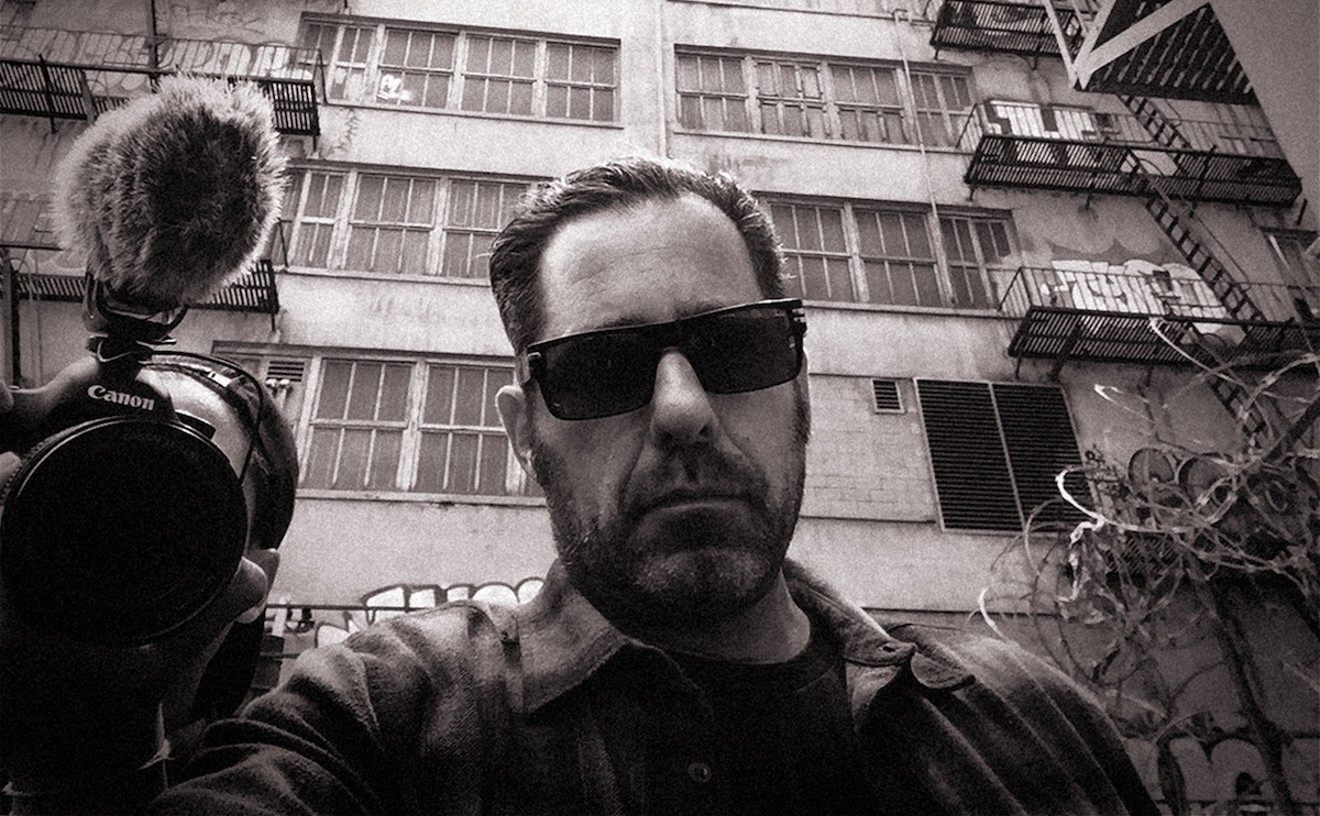And that makes Will "Da Real One" Bell, a six-foot five-inch, 36-year-old Liberty City native, the main draw at Miami Art Central for the Invitational Poetry Slam February 11. He is, after all, a two-time World International Poetry Slam champion.
"You can be heard from a spoken-word stage," Bell says in his booming baritone voice. "It builds your self-esteem."
Several months ago, museum organizers began searching for an event to accompany their William Kentridge exhibit, which is running at MAC through March 5. The show features works by the South African artist that reflect the turbulence of apartheid, so the organizers turned to South Florida's devoted faction of def poets, which is largely African-American.
"We produce public programs in addition to our art," explains Brooke Minto, MAC's associate manager of education and public programming. "We've had other literary events, but for the most part they've been traditional readings. This is the first spoken-word event."
Since its humble beginnings nearly twenty years ago in Chicago, when former construction worker/poet Marc Smith used slam as a gimmick to bolster his open-mike poetry nights, the genre has evolved considerably. Following HBO's hugely successful 2000 premiere of Russell Simmons Presents Def Poetry, the spoken-word slam skyrocketed into the mainstream. The brainchild of the multimedia mogul who founded hip-hop's Def Jam record label and director/producer Stan Lathan, Def Poetry gave Liberty City's Bell his first big break in August 2004.
"HBO's Def Poetry was requesting submissions, and I wasn't going to do it because I'm a man and I hate rejection," he laughs. "A friend of mine, Lorrie Tennant, just basically told me I had nothing to lose." (Tennant was later murdered.)
He wasn't rejected. He was given the standard three minutes to wow the crowd without props, costumes, cheat sheets, or any other assistance. Bell's delivery of "I Can't Write About That" and "So I Run" earned him a standing ovation.
"It appeals to so many people in the community because they're not poems; they are true confessions or so close to being true that the normal person can relate to them," Bell exclaims. "I mean we're human and that's what's taking the world by storm."
Despite his popularity, Bell continues to work hard at perfecting his craft. Seven days a week, from Palm Beach to Miami, he performs at universities, clubs, and the standard starving-artist locations like cafés and coffee shops. On Mondays you can always find him at North Miami's Literary Café, a joint he co-owns. But getting to this point wasn't easy.
Reminiscing about his start in the spoken-word arena, Bell recalls his troubled youth. Following expulsion from Douglas MacArthur North High School, he began dealing drugs at age nineteen. He was arrested for trafficking cocaine shortly thereafter and sentenced to serve a fourteen-month jail term. That period would change his life.
With so much time on his hands, he began writing rap songs, or poems, as his cellmate called them.
"Lendale Davis was his name," Bell recalls. "He looked at it and said that's a poem. I said that ain't a poem, it's a rap song. At that point in my life, in my mind, poetry was for pansies."
Since then, his pansy poetry has garnered the respect of peers, and Bell has achieved slam superhero status. He's made several national television appearances and has been dubbed the Tupac of poetry because of the stylistic similarities between his work and that of the late rapper, Tupac Shakur. But he's quick to distance himself from rap. "Back in the day, hip-hop used to describe situations that people could relate to; that's why hip-hop was a culture that was praised. Rap has lost its touch."
During an interview following his 2005 appearance on HBO's Russell Simmons Presents Def Poetry, Bell waged a verbal war against the rap industry, claiming it had run out of original material. For him, blazing the mike with thought-provoking dialogue sets spoken word apart.
"After years of trying to prove my place in society, it's like finally I found a place where I count as an individual," he booms. "For those three minutes, I have everybody's attention, everybody is focused on me, and I have something to share with them that actually has some substance."
He quotes his poetry: "And I'm wondering like how did I transform from righteous to crazy, asking myself questions like, Do I really want to take part in another mother screaming, 'Oh, God, not my baby!'?"
Saturday's slam will turn MAC's spotlight away from Kentridge's controversial works of art and onto the museum's 120-seat auditorium, where some of South Florida's freshest and most fearless voices will perform. Besides Bell, a handful of the nation's most proficient poets born and bred in Miami have also been invited to take part, including Rachel Finley, Daryl Payne, Asia, and Caheej.
"It's a personal invitation to what in South Florida are known to be the hottest spoken-word artists," Bell says.
At the end of what will be an exhilarating three-bout contest, a champ must be chosen. "This is a new beginning," contends Caheej, who will perform a new work, "Mister, Mister."
"I think the biggest misconception about South Florida is that we're lacking culture," Bell quips. Caheej agrees: "Hopefully we can expose people to another side of the city, the diverse, multifaceted side and bring them to a higher level of consciousness.
"The word is a powerful element."










